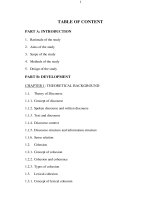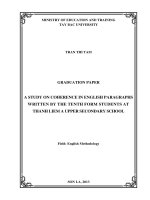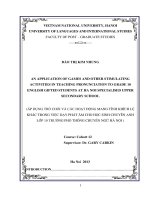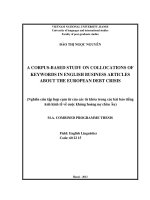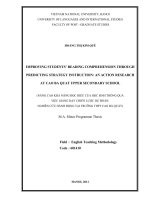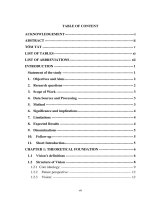Learning vocabulary through language games of 7th - form student at Phuong Nam Private lower Secondary school = Nghiên cứu về việc học từ vựng thông qua các trò.PDF
Bạn đang xem bản rút gọn của tài liệu. Xem và tải ngay bản đầy đủ của tài liệu tại đây (487.66 KB, 15 trang )
Vietnam NATIONAL UNIVERSITY, Hanoi
university of Languages and international STUDIES
faculty OF POSTGRADUATE STUDIES
TRẦN THỊ THU TRANG
LEARNING VOCABULARY THROUGH LANGUAGE GAMES OF
7
TH
-FORM STUDENTS AT PHUONG NAM PRIVATE LOWER
SECONDARY SCHOOL
(Nghiên cứu về việc học từ vựng thông qua các trò chơi ngôn ngữ của
học sinh lớp 7 trường THCSDL Phương Nam)
M.A. MINOR PROGRAME THESIS
Filed : English Teaching Methodology
Code : 601410
H NI – 2011
Vietnam NATIONAL UNIVERSITY, Hanoi
university of Languages AND INTERNATIONAL STUDIES
faculty OF POSTGRADUATE STUDIES
TRẦN THỊ THU TRANG
LEARNING VOCABULARY THROUGH LANGUAGE GAMES OF
7
TH
-FORM STUDENTS AT PHUONG NAM PRIVATE LOWER
SECONDARY SCHOOL
(Nghiên cứu về việc học từ vựng thông qua các trò chơi ngôn ngữ của
học sinh lớp 7 trường THCSDL Phương Nam)
M.A. MINOR PROGRAME THESIS
Filed : English Teaching Methodology
Code : 601410
Supervisor: Phan Hoà ng Yế n, M.A.
H NI – 2011
iv
TABLE OF CONTENTS
Page
Declaration
Acknowledgements
Abstract
Table of contents
Lists of tables and figures
i
ii
iii
iv
v
PART A: INTRODUCTION
1
1. Rationale
2. Aims of the study
3. Research questions
4. Scope of the study
5. Methods of the study
6. Design of the study
1
2
2
3
3
3
PART B: DEVELOPMENT
CHAPTER 1: LITERATURE REVIEW
5
1.1. A brief look into English vocabulary
1.1.1. Definitions of vocabulary
1.1.2. Classification of vocabulary
1.1.3. Aspects involved in learning a new word
1.1.4. The status of vocabulary in current language learning
1.1.5. Some reasons for undervaluation and neglect of vocabulary in
teaching and learning in the past
1.2. Language games in foreign language learning
1.2.1. Definitions of language games
1.2.2. Classification of language games
1.2.3. The status of language games in language learning
5
5
6
8
9
10
11
11
12
13
v
CHAPTER 2: RESEARCH METHODOLOGY
15
2.1. Subjects of the study
2.2. Data collection instruments and procedures
2.2.1. Data collection instruments
2.2.2. Procedures
15
15
15
16
CHAPTER 3: DARA ANALYSIS, DISCUSSION AND FINDINGS
17
3.1. Results and discussion from the questionnaires
3.1.1. Results and discussion form pre-task questionnaire
3.1.2. Results and discussion from post-task questionnaire
3.2. Results and discussion from the interviews
3.3. Summary of the findings
17
17
23
29
31
CHAPTER 4: IMPLICATIONS FOR USING LANGUAGE GAMES IN
TEACHING AND LEARNING VOCABULARY
33
4.1. Choosing appropriate games
4.2. When to use language games
4.3. Organization of the class
4.4. Learner participation
4.5. Explanation of language game rules
33
34
34
35
36
PART C: CONCLUSION
37
1. Summary of the study
2. Limitations of the study
3. Suggestions for further study
37
37
38
REFERENCES
APPENDICES
39
I
APPENDIX 1
APPENDIX 2
APPENDIX 3
APPENDIX 4
APPENDIX 5
I
V
IX
X
XII
1
SUMARY OF THE RESEARCH STUDY
PART A: INTRODUCTION
1. Rationale
Learning a foreign language is hard work and for most people takes a commitment of time and
effort. We all know that learning a foreign language mainly involves learning the sound
system, grammar and vocabulary of that language. It is apparent that vocabulary learning
plays a crucial role in language learning as it helps learners to develop the four skills:
speaking, listening, reading and writing. Currently, the long neglected issue of vocabulary
acquisition is receiving attention in second language pedagogy. A number of research studies
recently conducted have dealt with lexical problems of language learners.
Recognizing the importance of vocabulary in language learning, however, most of English
classrooms in Vietnam today in general and at Phuong Nam private lower secondary school
where I am teaching English in particular, vocabulary teaching and learning has not been paid
enough attention to as it deserves. Vocabulary has not been taught separately but mixed with
lessons of reading, speaking, writing or listening. This causes many difficulties for teachers of
English to apply suitable teaching methods.
Another problem is that even though my students realize the importance of vocabulary in
language learning, most of them find it boring and learn vocabulary passively. They think that
it is simply an activity that teachers introduce new vocabulary and their task is just to copy
down the new word and remember its meaning.
As a teacher of English, in the teaching process, I also realize that when doing tasks in the
textbook or doing tests such as fifteen-minute tests, forty-five-minute tests etc, the most
common question my students often ask is "Can you tell me what this word means?" .
Moreover, many of my students often make complains that they learnt a lot of new words, but
2
only a few days later, most of the words seem to fade away in their minds and ask the teacher
how they can learn vocabulary effectively and find it an interesting activity.
In recent years, communicative language teaching (CLT) has been applied in Vietnam and this
led to the adaptation of textbooks used in secondary schools which are designed in the light of
CLT. In CLT classrooms, one of the activities that requires students to communicate actively
with their classmates and motivates students is playing language games. Regarding these
issues, it is important for English teachers to create an effective language-learning
environment, in which, the levels of anxiety are low and the levels of comfort are high and
which helps to motivate students to participate in learning vocabulary in the language
classroom.
For the above reasons, the researcher decided to conduct the study “Learning vocabulary
through language games of 7
th
-form students at Phuong Nam private lower secondary school”.
2. Aims of the study
This study is aimed at:
Investigating the current attitudes and main difficulties in learning vocabulary of 7
th
-
form students at Phuong Nam private lower secondary school.
Investigating the effectiveness of using language games in their vocabulary learning.
Providing some implications for using language games in vocabulary learning, based
on the students' feedback to the vocabulary lessons using language games,.
3. Research questions
To reach the aims of the study, the following research questions were proposed
What are students‟ attitudes towards vocabulary learning?
What are their main difficulties in learning vocabulary?
Is learning vocabulary through language games effective?
What are some implications for using language games in vocabulary learning?
3
4. Scope of the study
The study focuses on investigating the common attitudes and difficulties in learning
vocabulary and accessing the effectiveness of using language games in learning vocabulary of
7
th
-form students at Phuong Nam private lower secondary school.
5. Methods of the study
In the process of conducting this study, data is collected from survey questionnaires and
interviews with students. The survey questionnaires consist of two types: pre- task survey
questionnaire and post- task survey questionnaire. The pre- task survey questionnaire was
delivered to the students to find out their attitudes towards vocabulary learning as well as their
main difficulties in learning vocabulary. The post- task survey questionnaire was
administered after six lessons applying language games. Interviews were conducted with 5
students to cross- check the questionnaire data and collect detailed explanation for the student
respondents‟ attitudes related to the topic of the present study.
PART B: DEVELOPMENT
CHAPTER 1: LITERATURE REVIEW
In this chapter, some theoretical background of English vocabulary will be briefly presented
such as definitions, classification, the status of vocabulary in language learning, aspects
involved in learning a word and some possible reasons for undervaluation and neglect of
vocabulary in the past. In addition, an overview of language games including their definitions,
types and roles in language learning will be stated clearly.
CHAPTER 2: RESEARCH METHODOLOGY
2.1. Subjects of the study
The study was conducted at Phuong Nam Private Lower Secondary School. The subjects of
the study consist of forty-eight 7
th
form students from class 7A and 7B. Their age ranges from
11 to 12 and they have been learning English for at least 2 years. Their knowledge and
4
vocabulary of English are at elementary level. At Phuong Nam private lower secondary
School, students have four periods of English per week. In the teaching process, it is realized
that most of students are not fond of learning vocabulary. Most of them find it a boring and
difficult activity and do not want to spend time on it.
2.2. Data collection instruments and procedures
2.2.1. Data collection instruments
In order to obtain the data for this study, two main instruments were employed: survey
questionnaires and interviews.
2.2.2. Procedures
In collecting the data for this study, the following steps were done:
Firstly, the pre-task survey questionnaire was given to the subjects and they were asked to
complete it. This questionnaire is intended to investigate students‟ current attitudes and main
difficulties in learning vocabulary and their experience with language games as well. Then six
textbook content- based vocabulary lessons were applied with language games to teach the
students. After that, the post-task survey questionnaire was administered to the subjects to
assess the effectiveness of their learning vocabulary through language games and their
preferences and expectations. Both survey questionnaires were given out in the class time and
translated into Vietnamese in order to help students fully understand the contents of the
questions.
All the data gained through questionnaires then was processed, converted to percentages for
the convenience of analysis.
Next, after six lessons, interviews were conducted in Vietnamese with five students who were
chosen randomly from the two classes. The data collected from the interviews was transcribed
for the purpose of analysis. Each interview lasted about 7-10 minutes.
CHAPTER 3: DATA ANALYSIS, DISCUSSION AND FINDINGS
5
In this chapter, the data collected from the pre-task and post-task questionnaires will be
displayed in tables and charts. Following each table or chart is the analysis and discussion.
The results through the interviews are also presented in words. At the end of the chapter,
findings from the study will be summarized.
The findings of the study will be summarized as follows:
In the first place, the majority of the subjects are fully aware of the importance of learning
vocabulary in learning English.
Secondly, despite the above mentioned finding, most of them find learning vocabulary a dull
activity. Moreover, they face many difficulties in learning vocabulary such as remembering,
pronouncing and problems with their own ways of learning new words as well. Therefore, it is
important and essential for English teachers to change their habits of teaching vocabulary and
apply different methods to inspire students‟ interest in learning vocabulary.
Thirdly, after taking language games, most of the subjects show their enthusiasm and interest.
Making a comparison between the data gained in the pre-task questionnaire and in the post-
task questionnaire, it can be seen that there is a shift in students‟ attitudes towards language
games. At the beginning, many of them do not value the role of language games in English
learning and hold the concept that language games are just for relaxation or time- filler when
the class has nothing to do. Nevertheless, after experiencing vocabulary lessons with language
games, a lot of students entirely opt for games. More importantly, they confirm the
effectiveness of language games. Through language games introduced by the teacher, the
students themselves realize that they can learn and retain new words better. This is a positive
outcome and proves that the application of language games in teaching and learning
vocabulary is feasible.
Next, due to their fondness of language games, a high proportion of the students express that
they expect the teacher to organize them to play language games more often in groups, pairs or
the whole class. Very few students want to play games individually.
However, from the results of the questionnaires and interviews, there exist some problems and
obstacles when the students take part in games. A few students complain that the language
games used in vocabulary lesson are uninteresting and have no use. Besides, some of them do
not understand how to play games. Thus, they are unwilling to play the games and feel bored
and even stressful after joining. As a result, they do not make any progress in their learning
6
vocabulary. These findings should be taken into consideration and imply that the teacher
should be more careful and flexible in choosing language games for the students to play.
Finally, adding to some given options in the questionnaire, some students raise some other
interesting opinions in order for the teacher to make language games more effective in
vocabulary lessons such as choosing language games related to the contents of the lesson,
control the noise, time to play games, organization of the class or division into teams or groups
properly.
CHAPTER 4: IMPLICATIONS FOR USING LANGUAGE GAMES IN TEACHING
AND LEARNING
4.1. Choosing appropriate language games
Various factors should be taken into account when language games are used, one of which is
how to choose suitable games for students to play. Teachers should be very careful about
choosing games so that students will find them enjoyable. If properly designed, language
games give students valuable communicative practice (Larsen -Freeman, D., 2000).
In order for language games to bring desired effects, first of all teachers should consider the
level of games to fit students‟ language level and knowledge background. Games become
difficult when the task or the topic is unsuitable or outside the student's experience. In this
case, the challenge of the games is too great, which can discourage students. Thus, one point
teachers should bear in mind is that games should be used to revise and recycle previously
studied content, rather than involve new content. Moreover, a very important factor is that
language games should correspond to the content of the lesson; otherwise students may think
that they do not serve any serious educational aim, and if so, it will be a waste of time.
4.2. When to use language games
One common question often raised among teachers is that when it is the most effective to use
language games in teaching and learning process. The fact that games can be exploited at any
stages during the lesson may be the most suitable answer. As Hadfield (1984) stated, “Games
should be regarded as an integral part of the language syllabus, not as an amusing activity for
7
Friday afternoon or for the end of term. This suggests that the most useful place for these
games is at the free stage of the traditional progression from presentation through practice to
free communication, to be used as a culmination of the lesson”. Therefore, teachers should be
flexible in deciding when to use games. They can be used as warm-up activities at the
beginning of the class. Also, teachers may use them to revise the vocabulary of the previous
lesson for students or to get students to practice new words they have learnt. What is more,
games are great when both the teacher and students need a break from intense studying
4.3. Organization of the class
Students are often arranged to play games in pair work, group work, the whole class and
individuals. They are of special importance in playing games and in increasing the extent to
which students are actively involved. Thus, teachers should pay attention to organizing the
class. As Lee (1979) said, organization into groups is one way of multiplying language
practice. Four or five in a group are enough. Teachers should be able to go from group to
group quickly. Pair activity can give a still greater amount of communicative practice, though
there is less opportunity for consultation and mutual correction. Useful through pair activity or
group activity it is, however, we have to be content with teams where the classroom is very
crowded. Basing on types of games, purpose of using games and the number of students,
teachers should arrange the class appropriately.
Besides, in terms of class division, teachers should know children‟s psychological characters.
One noticeable point teachers should make sure that not all the best students end up in the
same group or team. If there is lack of competition or contest between teams, they should be
evenly matched. When the more advanced or more backward learners are unevenly
distributed, certain groups or team always win and this is discouraging for others. (Lee, 1979)
4.4. Learner participation
8
As with other language learning activities, one of the problems about language games is to get
everyone to take a full part. What ways should teachers do to ensure that shyer or less
advanced learners also take part actively? Lee (1979) suggested some solutions as below:
Sometimes a few minutes‟ silent preparation – time to think, and perhaps even to make
a note – will help an oral game (e.g. a guessing games) to go more quickly.
Often, it will help to put „reminder‟ words or phrases on the board, and vocabulary the
class know. At any stage of elementary course, teachers should know what words and
phrases the learners can already use to communicate in the language, and what they are
still uncertain of.
Let one of the learners, or several in turn, lead the activity while the teacher sit in the
class and takes part. The teacher can whisper suggestions to those who do not know
what to say, or the teacher can write down a word or two on a slip of paper and pass it
to them to give them an idea. He/ she sits near those who most require help.
If the teacher is asking for „hands up‟, he/ she should take care not to call upon the
same people over and over again to respond but pay attention to the whole class and
give hints to help shy or slow learners to speak.
Consider whether the game – possibly after the class as a whole has played it – can
also be played in groups or pairs. If it can, this in itself increases the amount of
participation. Teachers should use group and pair activity as much as possible.
Mutual help within the class or within the team or group should be encouraged.
4.5. Explanation of language game rules
This is an important factor to conduct games successfully that teachers should keep in mind.
The rules of games should be clearly explained and well understood by students. Otherwise,
they will not know how to play and may misunderstand the purpose of the game and they may
not get the benefits they should from the games. However, at the elementary level, Hadfield
9
(1984) suggests that games are best set up by demonstration rather than by lengthy
explanation.
PART C: CONCLUSION
1. Summary of the study
It is assumed that vocabulary is increasingly viewed as crucial to language acquisition.
However, in the researcher‟s teaching context, at Phuong Nam private lower secondary
school, it is found that despite students‟ awareness of the status of vocabulary in language
learning, most of them perceive it as a tedious process and have many difficulties in learning
vocabulary. These reasons give the researcher rationale to conduct the present study.
To sum up, this study is made up of three parts. The first one is the introduction which is
aimed to give readers an overview of the study including the reasons to conduct this study, the
aims, the research questions, the scope and the framework of the study.
The main part of the study is divided into four different chapters. Chapter 1, theoretical
background, serves as the basic foundation to back up the study. Chapter 2 and chapter 3 are
devoted to present research methodology and detailed levels of description of data analysis
and discussion. The findings of the study reveal that language games can help most of the
students learn vocabulary more effectively and interestingly. However, some students do not
support language games due to some factors. Basing on findings generalized from the results
of data, implications for using language games in teaching and learning vocabulary are
recommended.
The last part of the study is the conclusion where all the main contents of the study are
wrapped. In addition, the limitations and suggestions for further study are mentioned.
2. Limitations of the study
Due to the limitation of time, shortcomings are inevitable. Firstly, because of the time the
researcher spends conducting language games in vocabulary lessons is not long enough,
10
students do not get used to various types of language games. Thus, they may not be able to
give correct judgments about the roles of language games in vocabulary learning. It is evident
that the more time students spend on the games, the more benefits and effectiveness they can
gain from them. Besides, because all language games are exploited in class time, the
researcher has to cover other contents of the lesson in the textbook, so it is not simple work to
incorporate games into classes.
3. Suggestions for further study
Although there are controversial opinions about using language games in teaching and
learning, it cannot be denied that games can create enjoyable and relaxing atmosphere, which
helps students sustain their efforts of learning. Therefore, the researcher would like to
recommend the wide use of games in other aspects of language learning such as using
language games in teaching and learning four skills – reading, speaking, listening and writing
or grammar. Also, further studies dealing with solutions to overcome some problems when
conducting games are highly appreciated.
